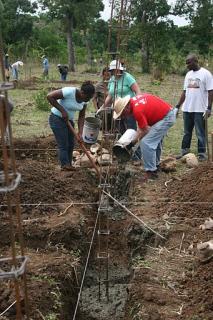Going to Haiti: Careful and Humble Listening to a Difficult Song
By Global Connections & Emerging Communities

The Unitarian Universalist Association (UUA) partnered with the Unitarian Universalist Service Committee (UUSC) on a joint volunteer trip to Haiti for seminarians, May 24-31. In the post below, participant Kevin Tarsa shares his thoughts on the journey to help rebuild the homes and lives of earthquake survivors in Haiti. On our first day helping to build the stone foundations of the first homes in this new eco-village, colleague Glenn Farley asked our Haitian coworkers if they would teach us a work song. A willing singer eventually found a song that seemed simple enough for us to sing. The refrain began, “O! Elanye! O! Elanye! O! Elanye!” We echoed each phrase with increasingly strength and surety. When we came to the final phrase, however — “O! Gade mize a pepla” – we bumbled our way way through, falling apart by the end. The Haitians within earshot burst into laughter, and then so did we. We tried several more times, but we never did quite get that final phrase before the foreman called our song teacher back to the work of laying a more earth-bound foundation. As Glenn later observed, our shared moment of laughter was a wonderful moment of connection. Later we learned the meaning of the words. The part of the song we learned easily means “O! Help! O! Help!” The second part of the song, the part we struggled with, means “Look at the misery of the people.” I have been struggling with the reality of the misery of the people. It is easy to visit this world of life in the Central Plateau of Haiti with a desire to help. The economic poverty is profound. It is easy to enter this world with a well-intentioned Universalist assumption that we are at heart all the same, that we share a common humanity with all the people we meet here. But it is not so simple. Yes, we share a common humanity, we can echo and learn the first part of the song and find a connection with our Haitian brethren, but the second part of the song is much more difficult to grasp. We cannot know, entirely, the realities and perspectives of the Haitian people. We cannot assume that we sing the same song in the same spirit without imposing our own way of seeing. To “look at the misery of the people,” to really look, will ask that we understand that there is a part of the song that is difficult to learn and that we can never get it completely even if we learn how to sing it. This invites a much more careful and humble listening to learn as much as we can about what the Haitians are singing and what their songs mean to them. It asks us to set aside our own assumptions and expectations, to listen with all our hearts, and hope for what benefits the people rather than serves our own needs. We did finally learn that final phrase of the song — sort of — after asking our translator to feed us one word at a time, slowly, after we repeated it several times and after we recorded it and wrote it down. I will carry the song with me now, though it will be my version of it. It will both connect me to the people here and remind me to listen with an open heart to the songs I may never fully understand. It is a valuable gift to take.